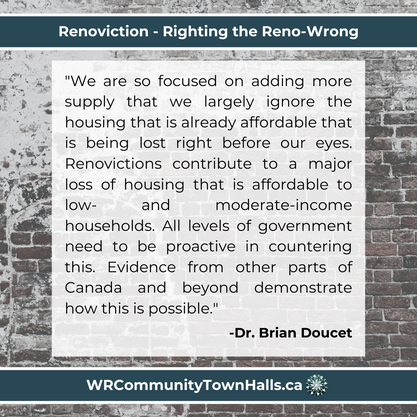Dr. Brian Doucet
Canada Research Chair and Associate Professor, School of Planning, University of Waterloo
|
Dr Doucet’s research examines housing, transportation and neighbourhood change. He uses a variety of research methods that render visible patterns, processes and experiences that do not normally show up in statistics. He currently leads five major SSHRC-funded research projects. Dr Doucet is the co-author of Streetcars and the Shifting Geographies of Toronto: a visual analysis of change (2022, University of Toronto Press), and the co-editor of the four volume book series Global Reflections on COVID-19 and Urban Inequalities (2021, Bristol University Press). Born and raised in Toronto, he resided in the Netherlands between 2004 – 2017, where he completed his PhD at Utrecht University in 2010.
|
Presentation
Dr. Brian Doucet talked about the power municipalities have to enforce strict building permit requirements to deter bad-faith renovictions. He cited New Westminster and Burnaby in British Columbia as exemplars, where city councils, under significant public pressure, enacted strong anti-renoviction bylaws. These bylaws require landlords to have a concrete plan for renovations and tenant relocations. They also mandate the provision of temporary accommodations and moving cost coverages, thereby placing the onus on landlords, not tenants.
|
|
Doucet was critical of Ontario's existing policies, which he feels place the burden of responsibility disproportionately on tenants. He highlighted how such rules in Ontario contrast with those in New Westminster and Burnaby, where tenant protection has been the primary focus. He indicated that despite these stringent laws, cities in British Columbia continue to flourish with ongoing developments, debunking the myth that such regulations would stifle growth or deter landlords.
In conclusion, Doucet stressed that the lack of proper statistics shouldn't deter people from acknowledging that renovictions are a real issue. The importance of collective stories and experiences should serve as compelling evidence. He believes that cities have the means to implement stricter rules, and they should do so to ensure a fair housing landscape.
In conclusion, Doucet stressed that the lack of proper statistics shouldn't deter people from acknowledging that renovictions are a real issue. The importance of collective stories and experiences should serve as compelling evidence. He believes that cities have the means to implement stricter rules, and they should do so to ensure a fair housing landscape.
|
"We are so focused on adding more supply that we largely ignore the housing that is already affordable that is being lost right before our eyes. Renovictions contribute to a major loss of housing that is affordable to low- and moderate-income households. All levels of government need to be proactive in countering this. Evidence from other parts of Canada and beyond demonstrate how this is possible."
-Dr. Brian Doucet
|
Some of Dr. Doucet's work includes:
- Doucet, B and Doucet, M (2022) Streetcars and the Shifting Geographies of Toronto: a visual analysis of change. Toronto: University of Toronto Press
- Doucet B, Diwan, F, Turman, W, Mehta N and Petrovic A (2022) Mapping displacement through lived experiences countermapping transit-induced gentrification in Kitchener-Waterloo, Ontario, Radical Housing Journal. 4(2).
- Tolfo, G and Doucet, B (2022) Livability for whom? Planning for livability and the gentrification of memory in Vancouver. Cities.
- McDougall, E and Doucet, B (2022) Polarized Paths: 'Selling' cycling in city and suburb. Tijdschrift voor Economische en Sociale Geofrafie.
- Doucet B (2021) The 'hidden' side of transit-induced gentrification and displacement along Waterloo Region's LRT corridor, Geoforum. 125, 27 - 46.




